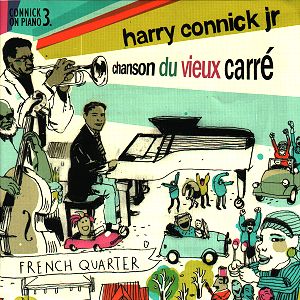1. Someday You’ll Be Sorry
2. Panama
3. Ash Wednesday
4. Chanson du Vieux Carré
5. Bourbon Street Parade
6. Petite Fleur
7. Fidgety Feet
8. Luscious
9. New Orleans
10. I Still Get Jealous
11. That’s a Plenty
12. Mardi Gras in New Orleans.
Harry Connick, Jr. – Piano
Neal Caine - Bass
Arthur Latin – Drums
Charles "Ned" Goold, James Greene
- Alto sax
Jerry Weldon, Mike Karn - Tenor sax
Dave Schumacher - Baritone sax
Leroy Jones - Trumpet, vocal
Roger Ingram, Derrick Gardner, Joe Magnarelli
– Trumpet
Lucien Barbarin - Trombone, vocal
Mark Mullins, Craig Klein, John Allred – Trombone
Joe Barati - Bass trombone.
Harry
Connick Jr. became famous as a singer who
also played the piano. But some of his recent
albums have stressed his abilities as a pianist
rather than as a vocalist. In fact he doesn’t
sing at all on this new disc, leaving the
vocals to two of his band members: Leroy Jones
on Bourbon Street Parade and Lucien
Barbarin on Luscious. Perhaps because
Connick became popular through singing on
the soundtrack of When Harry Met Sally,
he is still not accepted as a genuine jazz
performer by some pundits. Yet his devotion
to the piano style of Thelonious Monk and
his previous instrumental albums suggest that
he is a real jazzman.
In
fact Connick’s main talent on show in this
CD is as arranger for his big band. He wrote
the arrangements for all the tracks, as well
as composing three of the tunes. The album
was actually recorded in 2003, before Hurricane
Katrina so damaged New Orelans, but this collection
serves as a fitting tribute to the city, where
Harry was born 40 years ago.
Harry
is an interesting (I might even say unique)
arranger. He throws all kinds of sounds into
the mix and often introduces discords. Several
tracks end abruptly and the general mood is
similar to the cheeky impudence of Woody Herman’s
Herds. On the opening track, sections of the
band lurch in and out – sometimes inserting
exclamation marks into an otherwise placid
arrangement. Harry does an economical piano
solo, almost Basie-like in its minimalism.
The front sleeve lists this CD as "Connick
on Piano 3" but there was much more of
his piano on the two preceding albums, which
used fewer personnel. Craig Klein adds a nice
growling trombone solo, and Leroy Jones is
outspoken on trumpet. Leroy is a key member
of the band, soloing on many tracks and virtually
carrying Panama, as well as doing a
mannered vocal on Bourbon Street Parade.
Ash
Wednesday has an ominous, brooding feel
about it, with orchestral voicings reminiscent
of Stan Kenton. The title-track conveys something
of the same mood: a mournful piece featuring
Mark Mullins’s lonely trombone. Petite
Fleur goes against expectations by featuring
baritone saxist David Schumacher, while Fidgety
Feet treats the familiar melody with imaginative
licence. Luscious (a Connick original)
puts the spotlight on Lucien Barbarin and
his wah-wah trombone, backed by jungle drums.
His guttural vocal declares that he is "Luscious"
and who can argue?
Harry
Connick’s piano delicately states the theme
of New Orleans and his arrangement
warmly conveys the appeal of the city. I
Still Get Jealous (a little-known tune
by Sammy Cahn & Jule Styne from the 1947
musical High Button Shoes) is a brief
big-band flagwaver. That’s a Plenty
starts as a sort of street-band performance
before swinging into solos by Leroy Jones,
Lucien Barbarin and Charles "Ned"
Goold. The CD ends with Professor Longhair’s
Mardi Gras in New Orleans, appropriately
arranged in Longhair’s style, with that typical
Big Easy beat and breathing the very essence
of New Orleans.
I’ve
had my doubts about Harry Connick Jr. in the
past, wondering exactly how deep is his commitment
to jazz, but this album proves that he is
genuinely committed and can shine particularly
as a big-band arranger.
Tony Augarde
